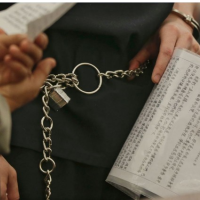Feds Agree to Limit Shackles for Immigrant Detainees, but Just in S.F. Court
 (photo: Julie Jacobson, Associated Press)
(photo: Julie Jacobson, Associated Press)
One small unshackled step for man . . .
In a settlement (pdf) that could hold national implications, the U.S. Immigrations and Customs Enforcement Agency (ICE) agreed not to shackle immigrant detainees appearing in a San Francisco court through most of their proceedings. For now, the agreement applies just to the one court, servicing about 2,000 detainees a year being held in three Northern California jails. It is unclear from court proceedings and news accounts how widespread shackling is in immigration courts nationally.
The agreement was in response to a class-action lawsuit filed in 2011 by the American Civil Liberties Union of Northern California, the Lawyers’ Committee for Civil Rights of the San Francisco Bay Area and Wilson Sonsini Goodrich & Rosati, which wanted an end to ICE’s blanket policy of shackling all adult detainees in immigrant court at the wrist, waist and ankle regardless of whether they are deemed a threat of any kind.
Under the agreement, shackling can continue but only when considered necessary on a case-by-case basis. More than 31,000 immigrants are currently in detention nationally at more than 300 facilities. Prisoners are held for many reasons, including not being able to afford bond. As of October 2009, barely half of detainees had felony convictions and 11% had committed violent crimes, according to the ACLU.
The lawsuit was brought by four prisoners. One of them, Uelian de Abadia-Peixoto, is a 35-year-old Brazilian woman with no history of making a fuss. She has plastic and steel plates in her knees, legs, feet, back, and head from previous injuries and doesn’t fare well when shackled.
The original complaint (pdf) alleged detainees suffered “dehumanizing” emotional and physical pain that “undermines the dignity of court proceedings.” It also hinders their “ability to function at full mental capacity during life-changing immigration hearings and undermines their ability to communicate with their attorneys.” Freedom from restraint, the attorneys argued, has always been recognized as a fundamental constitutional right that requires due process before it can be taken away.
Detainees are often carted to court in restraints from jails hours away and can easily end up in chains for 10 hours.
The Defendant Executive Office for Immigration Review, which administers San Francisco’s immigration courts, has deferred to ICE in determining the necessity of shackles. The lawsuit argued that the deference was an abdication of responsibility in light of ICE’s role in court proceedings.
The agency acts as prosecutor in court, and in advocating for deportation or other punishment it often seeks to portray the immigrant as dangerous and untrustworthy. Having them shackled sends a powerful message of presumed menace.
ACLU attorney Julia Harumi Mass said, “In addition to securing fairer hearings for detained immigrants in Northern California, we expect U.S. immigration officials will now think twice before shackling immigration detainees for their court hearings elsewhere in the country.”
That remains to be seen. ICE said in a statement that it was “committed to preserving the dignity and welfare of all those in our custody.” The agency signed off on the agreement, although it denied all allegations.
–Ken Broder
To Learn More:
VICTORY! In San Francisco, Immigration Detainees No Longer Shackled (ACLU of Northern California)
Feds to Limit Use of Shackles at Immigration Court (Associated Press)
Ice Agrees to Stop Shackling Some Defendants for Court (by Cindy Chang, Los Angeles Times)
Immigration Agency Accused of Holding 834 U.S. Citizens in L.A.-Based Lawsuit (by Matt Bewig, AllGov California)
Uelian de Abadia-Peixoto et al v. U.S. Department of Homeland Security and U.S. Immigration and Customs Enforcement et al (U.S. District Court Northern District of California San Francisco Division) (pdf)
- Top Stories
- Controversies
- Where is the Money Going?
- California and the Nation
- Appointments and Resignations
- Unusual News
- Latest News
- California Forbids U.S. Immigration Agents from Pretending to be Police
- California Lawmakers Urged to Strip “Self-Dealing” Tax Board of Its Duties
- Big Oil’s Grip on California
- Santa Cruz Police See Homeland Security Betrayal in Use of Gang Roundup as Cover for Immigration Raid
- Oil Companies Face Deadline to Stop Polluting California Groundwater





